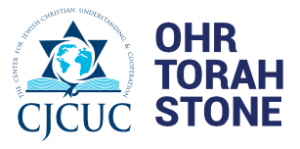Across the world, people were outraged by the news that mosques in Israel had been desecrated and racist graffiti scrawled across their walls. Israeli Jews felt ashamed. We asked ourselves: do the perpetrators have any understanding of Jewish history and theology, — which clearly teach respect for every human being and the necessity of standing up against injustice wherever we see it?
Growing up in the shadows of the Holocaust, I, a young British Jew, learned about Kristallnacht, the night in 1938 when dozens of German synagogues were attacked. In youth groups we discussed how the demonization of people and the destruction of their religious buildings were a first step to genocide. We proudly proclaimed, “never again” — never again should this happen to Jews; never again should it happen to any other people.
We understood the Biblical requirement for a sovereign Jewish state to care for everyone, including those who do not share our heritage.
Exploring our relationship to other faiths, we discovered that from medieval times, great rabbis taught their followers that Islam is a monotheistic religion whose adherents must be treated with respect. When the great Jewish philosopher, Maimonides, pondered why God had created so many people whose faith differed from his own, he concluded that although God’s will is unfathomable, Islam and Christianity seemed to be part of the divine plan to spread ethical monotheism throughout the world.
This liberal approach to other religious traditions was put to the test when the modern state of Israel was declared in 1948. How would the Jewish state treat other faith communities? The first Chief Rabbis of Israel considered the question and ruled unequivocally that according to Jewish law, Muslims and Christians were entitled to full citizenship in the new state. This ruling was affirmed in the Declaration of the State of Israel, which proclaimed that the new country would “uphold the full social and political equality of all its citizens, without distinction of race, creed or sex; will guarantee full freedom of conscience, worship, education and culture; will safeguard the sanctity and inviolability of the shrines and Holy Places of all religions”.
Ironically, it was Rabbi Abraham Isaac Kook, the first Chief Rabbi of the Holy Land and an icon of the religious Zionist movement, who warned that Jewish nationalism, like any other, contains the inherent dangers of xenophobia. He viewed the embryonic Jewish state as the fulfillment of ancient Biblical prophecies and he was convinced that it would be wondrous, creative and ethical. Still, he warned that unless the new country fulfilled its responsibilities to all its citizens, “it [would] eventually burst the bounds of morality when it oversteps its boundaries”.
His warning was apt. A xenophobic philosophy is breeding here which disregards the legitimate rights of Palestinians whose families have lived here for generations. It remains the preserve of a very small sector of Israeli society, but it is dangerous and must be stopped. Beginning with vile, triumphalist rhetoric, which led to attacks on Palestinian olive groves, it has grown into violence against people and mosques. Ironically, the violence is now turning inwards, morphing into attacks on Israeli soldiers whose job it is to maintain law and order, protect settlers and fulfill Israel’s commitment to remove illegal settlements.
Perhaps these developments are just part of a world phenomenon of increasing religious intolerance. Or perhaps they result from frustration at the Israeli withdrawal from Gaza which has not stopped the frequent rocket attacks over the border. Or perhaps it is Israeli fear that Iran has nuclear ambitions and wants to destroy Israel. These are the existential threats which frighten many Israeli Jews and destroy their faith in the possibility of peace. In the light of these, settlers resent the possibility that they will be removed from their homes in return for a chimera of peace.
Regardless of these fears, vigilante actions against innocent civilians, their property and places of worship are immoral, un-Jewish and unacceptable. They stain the name of religious believers and they stain the name of God.
We must denounce religious intolerance and work harder for dialogue and peace. We must urge our leaders to reach a fair settlement with the Palestinians, hastening the time when every inhabitant of this land can live with peace, justice and dignity. This is the vision of our prophets: “They will beat their swords into ploughshares and their spears into pruning hooks. Nation will not lift up sword against nation, nor will they learn war anymore” (Isaiah 2: 4).
This article was written by Rabbi Gideon D. Sylvester – a CJCUC Lecturer, the British United Synagogue’s Rabbi in Israel and directs the Rabbis for Human Rights Beit Midrash program, which studies Jewish perspectives on human rights, at the Hillel House of the Hebrew University of Jerusalem. This article was written for the Common Ground News Service and appeared in The Daily News Egypt website.
Hello world!
Welcome to WordPress. This is your first post. Edit or delete it, then start writing!
